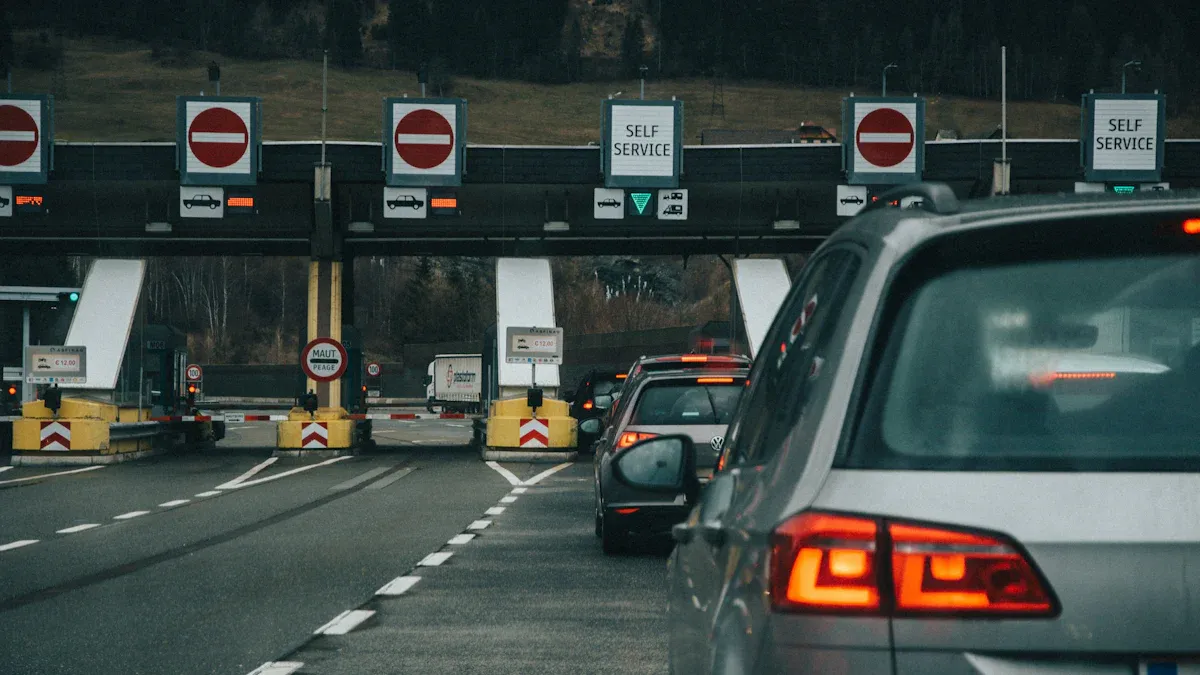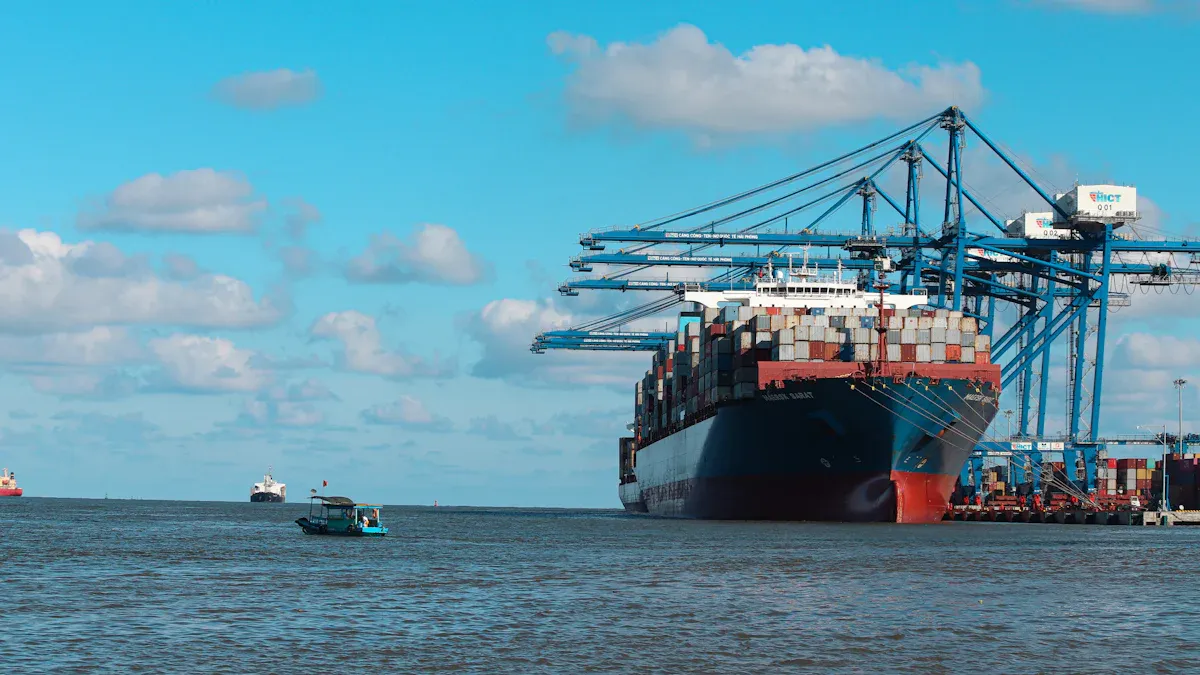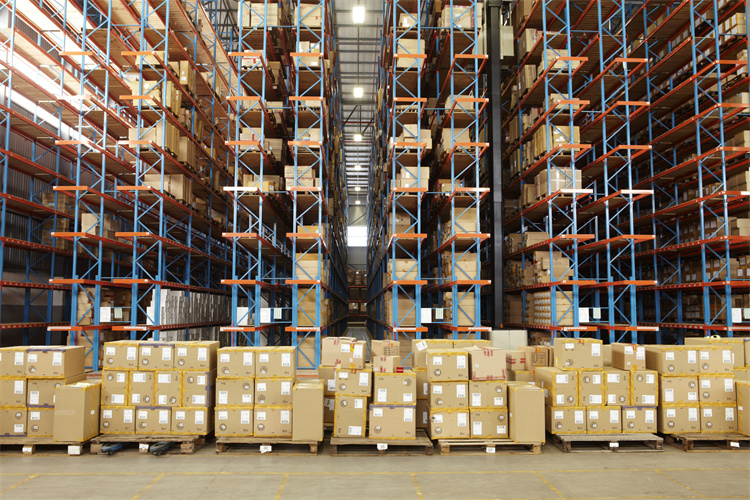Understanding the Latest Customs Clearance Changes This Year

In 2025, there are new customs clearance rules. These include lower entry thresholds. There are higher tariffs and stricter paperwork.
Change Type | Details |
|---|---|
Tariff Increases | |
HTS Changes | New codes start on January 1, 2025 |
Forced Labor Rules | More shipments are stopped for checks |
These changes can mess up supply chains. You need to update your steps. JUSDA helps you with digital warehousing. They also offer real-time customs solutions. |
Key Takeaways
Keep up with new customs rules for 2025. Every shipment must now get full clearance. The de minimis exemption is no longer available.
Use digital tools to follow customs rules. Automation can make things faster. It also helps stop mistakes in paperwork.
Think about using more suppliers. This plan helps lower risks from world events. It also helps if the supply chain has problems.
2025 Customs Clearance Updates

Key Regulatory Changes
There are many new customs clearance rules for 2025. Vietnam made new decrees like Decree 167/2025/ND-CP and Decree 182/2025/ND-CP. These decrees make customs steps easier. They also give import duty exemptions. Science and technology groups get the most help. The rules for authorized economic operator status are different now. Manufacturers have fewer rules to follow.
In the United States, you must use new customs steps. The de minimis exemption is gone. Now, every shipment needs full clearance. Europe has strict paperwork and classification rules. North America uses digital forms and declarations. Asia does more hands-on checks and follows local rules.
You should learn about new laws and changes. The table below lists some important updates:
Date | Law/Amendment | Description |
|---|---|---|
7 May 2025 | Decision No. 1261/QĐ-BCT | New steps for certificates of origin and import/export management. |
26 May 2025 | Circular No. 29/2025/TT-BTC | Changed customs steps for goods sent by international express delivery. |
Customs clearance uses more digital systems now. These systems use less paper and lower greenhouse gas emissions. Small businesses in Europe save up to 15% on costs with cloud customs platforms. The global market for customs digitization is growing quickly. It may reach USD 1.45 billion in 2025.
Effective Dates and Regions
You need to know when these changes start. In the United States, the de minimis exemption ends on August 29, 2025. Every shipment will need full customs clearance and duties. The USMCA “fentanyl” tariff surtax exemption starts on September 1, 2025. U.S.-origin goods that qualify for duty-free treatment will not pay the surtax.
Vietnam made new decrees in July 2025. These changes affect customs steps and import-export tax rules. Europe and Asia also have updates, but dates are different in each country.
The table below shows how customs clearance is different by region:
Region | |
|---|---|
North America | Digital forms and declarations are used a lot. |
Europe | Strict paperwork and classification rules are enforced. |
Asia | More hands-on checks and local rules are common. |
Impact on Global Supply Chains
Global supply chains will change a lot because of the 2025 updates. New tariffs, like a 25% duty on parts and vehicles from Mexico and Canada, will make car prices go up by 10%. Shipping costs from China to the U.S. may go up by 20-30%. This makes supply chains less efficient and trade more costly.
U.S. farm exports have higher container shipping costs. Prices went up from $600 to $800 per container. The EU is talking with the U.S. to lower the effect of new tariffs. Companies must change their supply chain plans. You should think about using more suppliers and updating your import and export plans.
Customs clearance times are different now. Air freight shipments finish customs checks in a few days. Sea freight takes 2-4 days after arrival, but busy ports can cause delays. Technology helps make some steps faster, but mistakes in paperwork still slow things down.
Digitization gives many benefits. Automated systems can cut export authorization time from one day to just three minutes. The WTO’s Trade Facilitation Agreement could lower global trade costs by up to 15%. This change could affect up to $1 trillion in global trade.
JUSDA helps you with these changes. You can use JUSDA’s digital warehousing and supply chain management tools to follow the new rules. JUSDA’s platforms help you track shipments, manage customs steps, and adjust to new customs rules. You can count on JUSDA for real-time updates and expert help.
Customs Compliance Updates 2025 for Businesses

New Documentation and Reporting
You have new customs compliance updates 2025. These updates change how you do paperwork. Customs authorities want electronic declarations for almost all shipments. You must send a customs declaration for every shipment. Customs procedures now use digital records. These records help you track goods and make fewer mistakes.
You must follow rules for each region. Some countries want data kept inside their borders. Some ask for privacy reports. Automation and AI tools help with customs compliance updates 2025. These tools make the customs process faster. They also cut down on manual checks. You need to know about international sanctions programs. Customs compliance updates 2025 focus on sanctions and export controls. This is because of global conflicts. If you break these rules, you may pay fines. Your reputation can also get hurt.
Customs compliance updates 2025 ask you to report on sustainability. Aviation and automotive companies must show their carbon footprint. You need to use eco-friendly methods and give reports. Vietnam has new food export rules. These rules need strict certification and safety tests. You must keep records of imports and exports for five years. Some goods need records kept even longer. Customs compliance updates 2025 make these steps required.
Tip: Always look for new policy content before shipping. Customs compliance updates 2025 can change fast.
Key compliance requirements for 2025:
Compliance Requirement | Description |
|---|---|
Enforcement is expanding, with increased scrutiny on certain goods. | |
De minimis treatment | This low-value loophole is effectively disappearing. |
Antidumping and countervailing duties (AD/CVD) | Broader coverage increases tariff exposure for routine shipments. |
Partner Government Agencies (PGAs) | Closer coordination with Customs tightens inspections and compliance. |
JUSDA Warehouse Solutions for Compliance
JUSDA helps you with customs compliance updates 2025. Their warehouse solutions use smart technology. You can use JUSDA’s cloud warehousing and JusLink platform. These tools help you manage customs steps and electronic declarations. You get real-time inventory tracking. You see every part of your import and export process. JUSDA’s systems support customs declarations and help you follow new rules.
JUSDA’s warehouses in Vietnam, China, the US, and Europe use smart tech. You get automated picking, packing, and labeling. These features make customs steps faster and lower mistakes. JUSDA’s eVMI and JusLink systems let you share data with customs and trade partners. You can track customs declarations and react to customs compliance updates 2025 quickly.
If you work in electronics, automotive, or FMCG, JUSDA’s warehouse solutions help you meet special compliance needs. You get clean rooms for electronics. Food exports have strict safety standards. JUSDA’s staff speak many languages and work closely with customs. This makes your import and export steps easier.
JUSDA warehouse advantages:
Real-time inventory control for customs compliance
Automated electronic declarations and customs procedures
Support for import duty exemptions and new policy content
Transparent customs framework for all shipments
Adaptation Strategies and Risk Prevention
You need strong strategies to handle customs compliance updates 2025. Customs rules change often. You must watch for policy changes and update your steps. Digital systems help you automate customs steps and lower mistakes. You should train your team to understand customs compliance updates 2025 and new rules.
Customs compliance updates 2025 mean you must protect your data. Cybersecurity keeps your trade information safe. You should add more suppliers to avoid risks from world events. Regular audits help you check your customs steps and paperwork. You must build a culture of compliance in your company.
Strategy | Description |
|---|---|
Regulatory Adaptation | Regular monitoring of policy changes ensures smooth operations. |
Advanced digital systems reduce errors in documentation. | |
Cybersecurity Measures | Strong data protection strategies safeguard sensitive trade information. |
Geopolitical Diversification | Expanding supplier networks mitigates trade uncertainties. |
Personnel Training | Continuous skill development improves procedural accuracy and efficiency. |
You should classify your goods correctly and use the right customs value. You need to check customs steps and authorizations. Routine checks help you get ready for a customs audit. You can ask experts for help with customs compliance updates 2025.
Customs compliance updates 2025 affect electronics, automotive, and FMCG in special ways. FMCG companies must follow health and environmental rules. Electronics and automotive businesses face supply chain problems and tech gaps. You need strong data protection and must follow sustainability laws. Packaging and waste rules are stricter now.
Common compliance risks in 2025:
Regulation changes and health/environment shifts
Supply chain disruptions and transparency demands
Resource shortages and tech integration gaps
Data protection and cybersecurity needs
Cross-border regulation friction
Sustainability and environmental laws
Consumer transparency demands
Packaging and waste management compliance
You can use AI tools to automate customs compliance updates 2025. These tools help you meet ESG standards and ethical sourcing rules. You should measure success with key indicators like customs clearance speed, error rate, and shipment cost. A 20% improvement in customs clearance shows you are adapting well to customs compliance updates 2025.
Note: JUSDA’s business compliance guide helps you follow customs compliance updates 2025. You get expert help for every step of your import and export process.

JUSDA Solutions
To provide you with professional solutions and quotations.
If you keep up with customs clearance changes in 2025, you can avoid big mistakes and slowdowns.
New tariffs, digital passports, and AI tools change customs rules.
Watching updates and using real-time data helps you manage risks.
Good sources are Customs & Global Trade Alert and US Customs Guide 101.
JUSDA’s smart warehouse and supply chain tools help you adjust fast. Working with JUSDA helps you follow rules, work better, and protect the environment in your worldwide business.
FAQ
What is the biggest customs clearance change in 2025?
You have to send electronic customs forms for every shipment. Many countries do not use the de minimis exemption anymore. You must follow tougher rules for all goods.
Tip: Always look up the newest customs rules before you ship.
How does JUSDA help you stay compliant with new customs rules?
JUSDA lets you track your inventory in real time. They give you digital help with customs. You can use JusLink to handle documents and follow new customs laws.
Which industries benefit most from JUSDA’s warehouse solutions?
Electronics, automotive, and FMCG companies get the most help. You get clean rooms, safety checks, and quick customs steps for your products.
See Also
Exploring Innovations in Sea Freight Logistics for 2024
Understanding Current Trends in Logistics Risk Management
Discovering JUSDA's Latest Warehousing Solutions for Efficiency
Transforming Future Logistics Through Digital Technology Advances
Achieving Cross-Border Trade Success Through JUSDA Solutions
